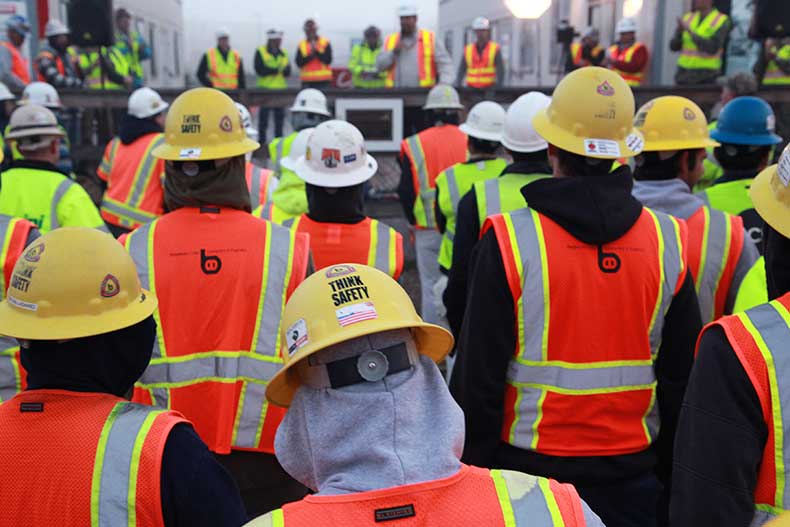When you consider the exponential growth of the construction industry in recent years, along with the projected growth that’s expected to occur in the coming decades, it’s easy to see why new construction start-ups are springing up left and right. Due to the abundance of building, renovation, and maintenance projects that need to be completed, there’s usually plenty of work for contractors and construction start-ups. However, landing clients and getting the work is only one half of the equation. To avoid unsatisfied clients, lawsuits, and other potentially negative consequences, you’ll need to take certain steps and precautions related to work safety and quality control. Heed the following seven tips and you should be able to safely launch any kind of construction company with minimal risk:

-
Require Appropriate Work Attire and Gear
It’s important to enforce a strict dress code for all employees participating in construction, especially in relation to safety footwear requirements. Engelbert strauss offer a range of safety shoes that are ideal for construction, landscaping, gardening, and other heavy-duty work applications. Check out the full line of engelbert strauss products to get an idea of work footwear and other kinds of safety wear that your labour force should have.
-
Obtain the Necessary Insurance and Licensing
The exact licensing and insurance that you’ll need to obtain will vary depending on where your company is operating and the kind of work you’ll be doing. You may want to look into obtaining contractor’s accreditation from the Federation of Master Builders. Consult with local regulatory authorities to determine the exact permit and licensing requirements in your area. Do not attempt to skip past this step, as you could incur hefty fines and penalties and put the entire business at risk if you’re caught operating without the required permits, licenses, and insurance coverage.
-
Don’t Bid on Projects That You Can’t Yet Handle
Some construction start-ups make the mistake of applying for projects that they’re not yet properly equipped to complete. If you’re not fully confident that you have the right employees, equipment, materials, and experience to get the job done right, don’t even apply. While the lure of landing a big contract right out of the gate may be tempting, think about the potential backlash of losing the client due to satisfaction issues or worse consequences. In the beginning, your priority should be safety and a perfect satisfaction rate. So, go for the easier contracts to build momentum.
-
Keep Overheads and Payroll Minimal
Excessive overheads and payroll expenses can smother a start-up by hindering cash flow. If you don’t adhere to a budget and cap your expenses at a set amount, you could find yourself struggling to break even on a monthly basis. You may want to work with freelancers and independent contractors that can supply labour and materials on a per-project basis, as opposed to funding an ongoing salary for an entire team. When you add up the cost of paying a weekly salary for a full construction team, alongside the cost of renting and buying equipment and materials, the overheads can be substantial. Limit your financial commitments and arrange contracts that allow the client to pay for materials and other expenses through escrowed funds.
-
Have an Attorney on Call
When you’re in the construction business, eventually you may encounter a situation in which you’re facing litigation threats or other potential court proceedings. Scrambling at the last minute to contact an attorney you’ve never spoken to might not be the best idea. Instead, go ahead and consult with a solicitor that specialises in construction. Talk to them about your company’s structure, activities, and any concerns you may have. Then, if you do eventually encounter legal woes in the future, you’ll know who to call immediately.
-
Only Use Quality Materials and Tools
Managing a construction company isn’t always about maximising profits. As the owner or manager of a start-up, you’ll probably get the urge to look for the cheapest suppliers. However, cutting costs by purchasing lower quality materials isn’t a wise trade-off to make. Sure, you may make a little more profit, but you’re significantly increasing the risk of encountering problems. Morever, helpful tools increase efficiency in the process such as a project management software that offers RFI management. RFI stands for Request for Information and is common in the business construction process.
-
Thoroughly Screen All Employees
A construction start-up can only be as good as its staff. If you’re in a rush to assemble a team and you aren’t being selective about who you hire, you could wind up dealing with unnecessary issues related to employee efficiency and work quality. Thus, it’s imperative to follow a comprehensive checklist when comparing job candidates.
Safety Should be Every Construction Start-up’s Top Priority
As a start-up in any industry, it’s easy to get caught up in the hype of generating better metrics. A company that can prove ongoing fiscal improvement will be more likely to gain support from investors and prospective clients, but safety and quality control are factors that shouldn’t be overshadowed by any aspect of business management.